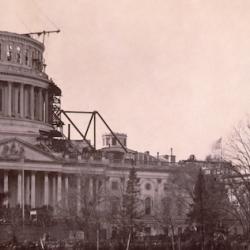Reflecting on the lessons of Donald Trump in a piece at Public Discourse, Matthew Wright points to The Speechwriter, a recent book by Barton Swaim, former speechwriter to South Carolina Governor Mark Sanford.
Wright summarizes, “Armed with a Ph.D. in English from Edinburgh, Swaim took up speechwriting with romantic notions of wordsmithery: ‘The speechwriter, I felt, was a person whose job it was to put words in the mouths of the powerful, who understood the import and varieties of political language and guided his master through its perils.’” It didn’t turn out that way. as Swaim found himself caught in “one great blizzard of verbiage.” The governor was expected to have something to say about everything, and his speechwriters had to formulate opinions that “said something without saying anything. It would get the governor on record without committing him to any course of action.”
According to Wright, “Most often Swaim achieved ambiguity through superfluity—padded phrases that fill out a press release without adding real content. ‘Law enforcement’ becomes ‘state and local law enforcement’; citizens and political opponents are solemnly warned against ‘rushing to judgment’ and ‘making accusations in the absence of evidence’ – all words spoken with the intent to avoid substance. Other times, Swaim observes, the superfluity simply evoked desirable feelings in a constituent, rather than actively dissembling. By larding sentences with extraneous words and phrases—an ‘in large measure’ here, a ‘Given the fact that’ there—he said, ‘you’ve turned a perfunctory note into a heartfelt letter on which some time was spent.’ It’s the impression—the feeling—that matters, not the meaning.”
Swaim highlights what Wright describes as the “unnaturalness of much of our political speech,” driven by the need to speak to all and everything. Swaim writes, that many “don’t appreciate the sheer number of things on which a politician is expected to have a position. Issues on which the governor had no strong opinions, events over which he had no control, situations on which it served no useful purpose for him to comment— all required some kind of remark from our office.” Churning out words “fosters a sense that you don’t have to believe your own words. You get comfortable with insincerity.” Wright glosses: “words become political tools separated from their meanings. The unnaturalness of our rhetoric hollows it out.” Bad words deflate the good.
And do we still wonder, Wright asks, at the popularity of “a man who parades around saying things the only possible virtue of which is that – if even for a moment – it’s what he actually thinks”?











